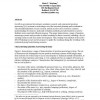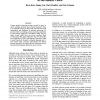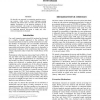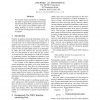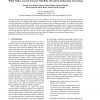123
click to vote
NDQA
2003
15 years 3 months ago
2003
The use of the web has become popular and also the need of services that could exploit the vast amount of information in it. Therefore, there is a need for automated question answ...
121
click to vote
NDQA
2003
15 years 3 months ago
2003
Early TREC-style Question Answering Systems were characterized by the following features: (a) the answer of the question was known to be included in a given local corpus, (b) the ...
143
click to vote
NDQA
2003
15 years 3 months ago
2003
Growth in government investment, academic research, and commercial question answering (QA) systems is motivating a need for increased planning and coordination. The internationali...
125
click to vote
NDQA
2003
15 years 3 months ago
2003
Current question answering systems succeed in many respects regarding questions about textual documents. However, information exists in other media, which provides both opportunit...
113
click to vote
NDQA
2003
15 years 3 months ago
2003
We describe our approach in constructing question answering systems, which involves natural language parsing enhanced with named entity extraction and part-of-speech tagging. Perf...
102
click to vote
NAACL
2003
15 years 3 months ago
2003
We describe initial experiments in combining the output of question answering systems using data from the 2002 TREC Question Answering task. We explore several distance-based comb...
119
click to vote
INTERACT
2003
15 years 3 months ago
2003
: Question answering systems have proven to be helpful to users because they can provide succinct answers that do not require users to wade through a large number of documents. How...
107
click to vote
ACL
2006
15 years 3 months ago
2006
We present a Korean question answering framework for restricted domains, called K-QARD. K-QARD is developed to achieve domain portability and robustness, and the framework is succ...
124
click to vote
LREC
2008
15 years 3 months ago
2008
This paper presents the sequential evaluation of the question answering system SQuaLIA. This system is based on the same sequential process as most statistical question answering ...
119
click to vote
ECIR
2007
Springer
15 years 3 months ago
2007
Springer
Question answering systems rely on retrieval components to identify documents that contain an answer to a user’s question. The formulation of queries that are used for retrieving...

